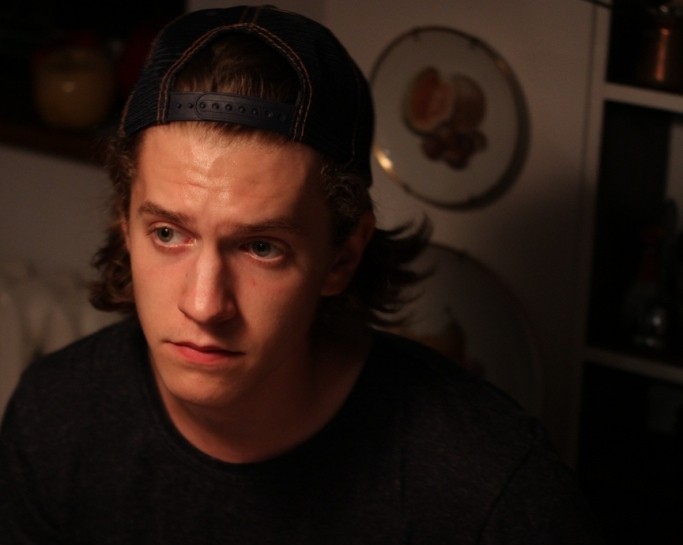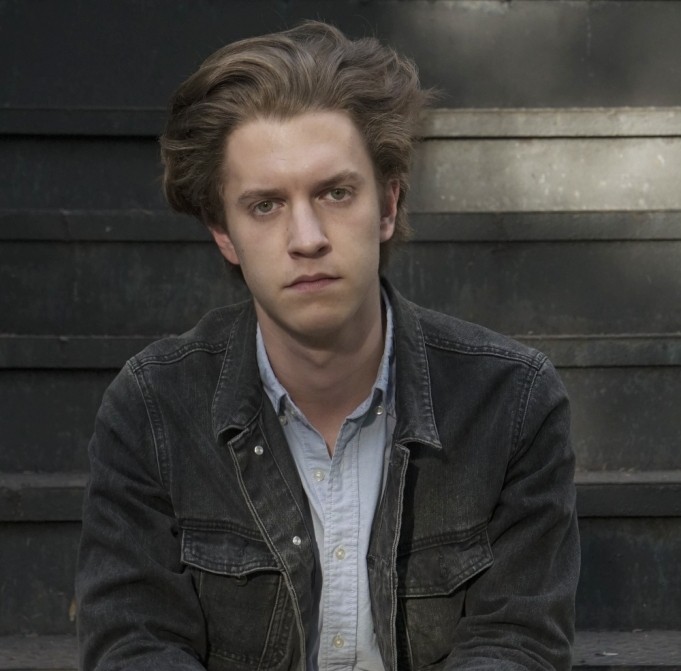- How would you describe yourself in three sentences?
I don’t really talk about myself as much as I like to discuss the things I’m working on, or simply the things I enjoy. These things are almost always related to music, cinema and good food. I often wish I could be everywhere at the same time.
- What is the most important thing you learned in your teens?
One should always put more effort than what’s expected. This applies to everything.
- How did you get into cinema as a professional activity? What inspired you?
The short answer would be All That Jazz by Bob Fosse, which I saw at a local theatre when I was 13. Aside from that, everything happened quite abruptly and the story isn’t all that thrilling. I had always shown great interest in cinema, and I had always enjoyed it, but up until 10th grade, I wanted to become a chef – a pastry chef, to be exact. In January 2012, however, I applied for the “Young European Jury” of a French film and television festival – the FIPA (Festival International de Programmes Audiovisuels) in Biarritz. I was selected and I was thrown in an environment which I immediately felt I wanted to remain in. Two months later, the same thing happened at the Sofia International Film Festival. From then on, it felt as though there was no turning back. I went on to study film and, several years later, I started writing and directing. I haven’t given it much thought, but at this point, I can’t imagine myself doing anything else.
- You’ve studied film in London – what’s the most important thing you learned about cinema there?
I studied film studies, more specifically. The main things I discovered might actually come off as trivial. Mostly, I realised that there are too many great works we’ll never get to see, or even hear about. I often think about that and it saddens me. I understood that it is important to be able to distance oneself from one’s primal, strong opinions and give more structured thought to what has been seen, heard and felt. It can happen from any perspective – cinematic, political, or simply human. Perhaps it isn’t always possible, but when it is, it’s important.
- What is your greatest experience related to cinema?
There are too many, but I had the chance to see Kubrick’s Odyssey from a stunning copy taken from the director’s archive. It was projected on 70mm with the original six-track stereo magnetic soundtrack. Douglas Trumbull, the special effects supervisor, was also there. What a great man. It was tremendously powerful. Trumbull himself was almost moved to tears.
- How do you see yourself in the film industry – as a producer, writer, director, etc.?
Mostly as a writer/director. They go hand in hand, as far as I’m concerned. I don’t like the idea of directing other people’s scripts, even if it doesn’t bother me when other people do it. I like my work to be personal and wholesome. Still, I’ll be doing my master’s degree in producing next year… The reason is that, for now anyway, I want to make strictly Bulgarian films, and one should be able to be one’s own producer here – at least partly. I’m not all that competent when it comes to financing, negotiation and so on. Unlike studying directing, I think such a training can be extremely beneficial for me, even if I don’t need to produce anything in the future.
-Which film have you seen most times? Why is that?
I’d have to list three. Paris, Texas by Wim Wenders, The Sacrifice by Andrei Tarkovsky, and The Diving Bell and the Butterfly by Julian Schnabel. I consider them not only three radically different Filmmaking 101 textbooks – the reason is also very personal. You’ll notice that they have one theme in common: the role, presence, absence and loss of a father.
- What kind of films would you like to see more of? (genres, themes, productions)
I want to see more quality horror films and dynamic, surrealist thrillers. For several years now, I have been worshipping A24, who systematically provide the best ones out there. Even more than that, I’d like the infuriating and anti-productive relationship between the origin of films and their content to disappear completely. More specifically, I’d like Bulgarian films – at least the ones shown outside of the country – to not necessarily be raw, naturalist depictions of dying elders in the countryside, heroin and rape, corruption and immigration. There are some very good ones – and let there be more – but we need something else, too. In this sense, I’m thrilled to hear that Ilian Metev’s feature debut, 3/4, is about a young pianist, her absurd little brother and their helpless father. It sounds like a breath of fresh air. I wish him the best of luck at the Locarno festival.
- What promotional activities related to cinema that you’ve seen in London and Paris would you like to see here?
It’s hard to say, actually. The Parisian and London models are hardly comparable to Bulgaria. Even historically, there is another kind and scale of cinema-going culture and interest in film diversity there. The French Cinemathèque and the BFI, for instance, are nearly always full to the brim, regardless of whether they’re showing a silent Mizoguchi film or a programme of contemporary avant-garde shorts. I wouldn’t say it is thanks to exceptional promotional activities – these institutions and cities have simply always been pillars of the European film culture and, in many ways, they’re unbeatable! There aren’t just many more people to see the films – these people haven’t been deprived of half a century of foreign cinema (roughly half of film history). They know it, remember it and love it. In Bulgaria, this hadn’t been possible for a long time – at least not for the general audience. At this point, the promotional practices are similar, but our film memory and diversity have undergone great delays and have fundamentally started from square one slightly less than thirty years ago. Of course, a greater implication of the media and some online publications in promoting cinema would be extremely beneficial. I’d like to see larger-scale events such as the R.W. Fassbinder retrospective which took place in 2016 in partnership with Goethe-Institut. It included talks, late-night parties, and was heavily publicized – and, consequently, attended. I also suspect that similar partnerships provide more funds for promotional activities.
- Favorite line or scene from a film – ever?
I wouldn’t say anything is “ever” to me, but I distinctly remember hyperventilating when seeing Carlos Reygadas’ Japón on the big screen for the first time. There is a scene in which the exhausted main protagonist collapses on a massive cliff next to an abandoned dying horse. The camera hectically spins around them and moves upward, revealing a sublime yet terrifying landscape, as the man and horse disappear into the distance. All that to the sound of “Erbarme dich” from J. S. Bach’s “Matthäus-Passion” (which also appears in Tarkovsky‘s The Sacrifice).
28 TIMES CINEMA
-Based on your experience as a film jury member, do you believe the audience in an accurate indicator of a film’s success? Do you distinguish your personal stylistic preferences when you vote – do you rely on your feeling for a given work?
Maybe not always accurate, but always important. My mother and I have been having this conversation since I was 16. Nobody wants their film to only be seen by one or two juries. However small it may be, each film has a target audience. Cinema fundamentally exists through the audience. It doesn’t matter whether people like it, feel provoked by it or despise it. If there is curiosity, then at least something is done right. Of course, this doesn’t mean that the films which do not attract the same attention aren’t worthy. There are just too many external factors. As I said, I try to stay away from my personal preferences as much as possible – and, in fairness, I couldn’t say what kind of films I specifically like and what kind I specifically don’t. When an idea is developed and communicated properly I usually feel it, even when I’m not crazy about it.
-How are you getting ready for Venice?
I mostly insist on getting to know the titles from the line-up, which will be announced on the 25th of July, very well. If possible, I’d like to watch the filmmakers’ previous work and familiarize myself with the context of the countries, narratives and productions. Over the course of the festival, I won’t have any time for this kind of research, so it’s really important to do it beforehand. I also need to warm up with some formal writing. About a year ago, this was my only activity. Now that I have turned mostly to practice, I haven’t been writing as much – and we will be doing it lots.
-What do you consider the most important qualities for a jury? What advantages do you have; which part of your experience will contribute to 28 TIMES CINEMA?
The jury needs to be attentive, as little biased as possible (and certainly not aggressively biased), and always open to debate. It’s strange – I often think that my academic studies can be an obstacle when working on a film. I delve into unnecessary analyses while writing and directing, which can be limiting. Conversely, I feel like my practical experience has really consolidated my understanding and judgment when it comes to cinema. I thought that, by now, I would be used to the whole festival process but really, Venice is something else entirely. All jury members are very different and, I’m sure, extremely interesting and intelligent. I don’t know what else to say at this point – it’s different every time.
- What do you expect from Venice?
Talented and curious people; busyness and elegance; countless languages and good pasta.
- In what direction would you like your work there to take you?
Actually, this is perfectly in line with what I have been doing so far. It simply is the most extraordinary environment in which I have had the opportunity to practice it in. I am already in a rather active period of my life, but also at quite an early stage of my career. In this sense, I hope that the people I meet in Venice will remain more stable and long-term contacts and colleagues in the future, regardless of whether it is in an office or on set.





